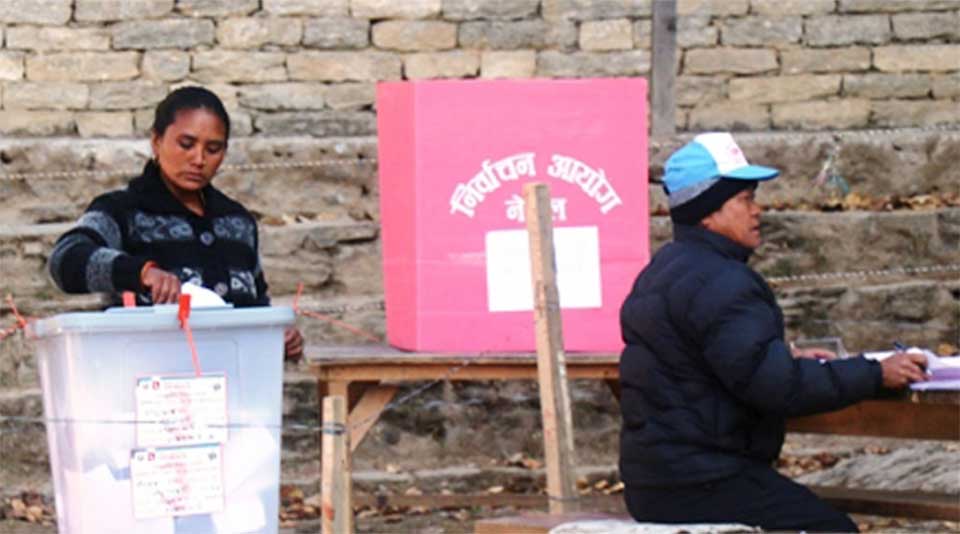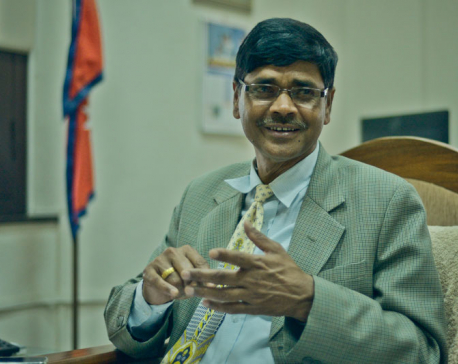
OR
2017: A year packed with momentous political events
Published On: December 31, 2017 06:00 AM NPT By: Republica | @RepublicaNepal

KATHMANDU, Dec 31: 2017 will go down in history as a year that became a turning point for Nepal, a period packed with numerous events which proved momentous in ending the decade-long political transition and set the course for the country's journey toward a federal republic.
Here is a recap of some key political developments:
Deuba in power for the fourth time
Given his questionable legacy, there was a widespread skepticism that his fourth term would be any different from his previous stints as prime minister when Nepali Congress President Sher Bahadur Deuba took the helm of Singha Durbar in July. Not many were convinced that Deuba would do what he had promised to do: to hold three tiers of elections--- the final phase of civic polls in Province 2 and election of federal parliament and provincial assemblies---in a short time span of nine months.
Despite the odds he faced and the bumpy start that marked few weeks of his premiership, Deuba successfully delivered what he had promised. With the successful conclusion of three tiers of elections did not only Nepal come out of a decade-long political transition but also rescued Deuba's reputation tainted by numerous episode of failures.
But Deuba's fourth term proved hardly any better than his previous terms on other fronts, notably the issue of good governance. He promoted corruption and misuse of power through many controversial decisions like the formation of a bloated cabinet, the appointment of the police chief, and cash distribution from the state coffers. Many think that Deuba's poor leadership might be one reason behind NC's stinging defeat in the recently held polls.
Local Polls
Though Nepal adopted federalism in its new constitution promulgated in 2015, Nepalis had to wait until the local elections to see it implemented. The local poll was held in three phases respectively on May 14, June 14 and September 8. A total of 753 local units elected 36,000 representatives for various positions. It was a momentous occasion given that the local bodies had remained vacant for the last two decades.
As expected, the UML emerged as the largest party followed by the Nepali Congress and CPN (Maoist Center). The mixed results of the local polls proved a blessing in disguise to lure parties to go to parliamentary and provincial elections without further delay. The parties were initially hesitant to go to polls as they were apprehensive of the possible setback.
The local polls have brought much-needed stability at the local level while making public service more accessible. However, local bodies have not been able to live up to the expectation of the people who voted to see a Singha Durbar, Nepal's administrative hub, in each village.
Parliamentary and provincial elections
The elections held in two phases on November 26 and December 7 saw the left alliance comprising the CPN-UML and CPN (Maoist Center) take near 70 percent seats in the federal parliament. The left alliance won a landslide victory in six of the seven provinces. The election and its outcome are expected to usher Nepal into an era of political stability.
Nepali Congress, despite a slight decrease in its share of popular votes compared to past elections including the local polls, held a few months ago, suffered heavy loss at the hands of the left alliance. Several senior NC leaders including senior leader Ram Chandra Poudel, vice president Bimalendra Nidhi, six-time finance minister Ram Sharan Mahat and Arjun Narshing KC were defeated.
From the beginning, it was evident that the left was headed for a resounding win. Besides cashing in on its populist stance, the left alliance was successful to present itself as a cure to all problems facing Nepal: the sluggish development, outbound migration, unemployment and political instability. While the left was calling to vote for a stable government, Deuba was losing public goodwill for his wish to become the prime minister for another term.
Nothing perhaps hurt the grand old party more than the selection of deeply unpopular candidates.
Bal Krishna Dhungel's arrest
Nepal Police arrested fugitive Maoist leader Bal Krisha Dhungel who was convicted of the murder of Ujjan Kumar Shrestha of Okhaldhunnga during the insurgency. Dhungel was elected a lawmaker in 2008 from the Maoist party which had been protecting Dhungel, allowing him to walk free hiding from the law enforcement authorities. The arrest of Dhungel came after the Supreme Court ordered the police chief to appear in the court responding to a writ petition. He has been serving the remaining 12 years sentence in Dillibazar jail following the court order.
Dhungel's arrest has been seen meaningfully as many hope that this has paved the way to give justice to other victims of war-era crimes. But the offshoots of former Maoist rebel have described Dhungel's arrest as a conspiracy to derail the peace process.
Left Alliance
In a dramatic move, two left parties -K P Oli-led CPN-UML and Pushpa Kamal Dahal-led CPN (Maoist Center) forged an electoral alliance and also announced party unification in the near future on October 4. The surprising decision of the Maoist Center, which was sharing the government with the Nepali Congress (NC), resulted in securing majority seats in the central parliament and six of seven provincial assemblies for the alliance.
Though Baburam Bhattarai-led Naya Shakti had also forged the alliance with the left parties, in the beginning, Bhattarai severed ties before the nomination, venting ire after he was not given ticket by the alliance in Gorkha district.
Encouraged by the polls' mandate, the two parties have started groundwork to take ahead the planned merger, while simultaneously working to strike a power-sharing deal.
You May Like This

Political parties intertwining voter education with political campaign
BAITADI, June 3: The political parties in Baitadi district that are gearing up for the second phase of local level... Read More...

Political understanding vital for election: CEC Yadav
HETAUDA, Dec 21: Chief Election Commissioner (CEC) Ayodhi Prasad Yadav has said the elections of all three tiers would be... Read More...

Just In
- 19 hydropower projects to be showcased at investment summit
- Global oil and gold prices surge as Israel retaliates against Iran
- Sajha Yatayat cancels CEO appointment process for lack of candidates
- Govt padlocks Nepal Scouts’ property illegally occupied by NC lawmaker Deepak Khadka
- FWEAN meets with President Paudel to solicit support for women entrepreneurship
- Koshi provincial assembly passes resolution motion calling for special session by majority votes
- Court extends detention of Dipesh Pun after his failure to submit bail amount
- G Motors unveils Skywell Premium Luxury EV SUV with 620 km range
















Leave A Comment